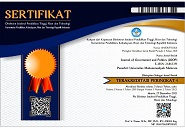The Influence of Empowerment on the Entrepreneurial Ability of Micro Enterprises in Surabaya City
Abstract
The ability of micro enterprises to grow and adapt is important in advancing the national economy. Therefore, supporting the empowerment of micro enterprises by the government is a strategic step that needs to be taken. The Surabaya City Government supports the empowerment of micro enterprises by stipulating Surabaya City Regional Regulation No. 1 of 2021. The Culinary Tourism Center (SWK) is an empowerment facility spread across 51 locations in Surabaya City and has accommodated 1,217 micro enterprises. However, in its development, micro enterprises face the problem of SWK conditions that are empty of visitors and limited understanding of digital marketing. Therefore, the purpose of this study was to examine the influence of micro enterprise empowerment on the ability of micro enterprises in the Culinary Tourism Centers of Surabaya City. This study uses an associative quantitative method to measure the extent to which micro enterprise empowerment (X) affects micro enterprise abilities (Y). The sample included 100 micro enterprises from 51 SWK, chosen through simple random sampling. The data analysis technique used regression analysis with SPSS version 30. The research findings show that variable X significantly and positively affects variable Y, evidenced by a significance level below 0.001 (p < 0.05) and a t-value of 10.332, which exceeds the critical t-value of 1.66055. Additionally, the coefficient of determination (R²) is 0.521, showing a strong relationship between the two variables. Despite the positive results, the Surabaya City Government still needs to design and implement a strategic empowerment concept with clear Standard Operating Procedures.
Keywords
Full Text:
PDFReferences
Amelia, D., Setiaji, B., Primadewi, K., & Habibah, U. (2023). Metode Penelitian Kuantitatif. Yayasan Penerbit Muhammad Zaini.
Anaqi, I., Kurniawan, D., Marcela, T. P., Claudia, D., Jorger, V., Aziz, P. N., Suranti, N., Sukmah, M., & Ariescy, R. R. (2023). Pengembangan Digitalisasi Marketing Usaha UMKM Untuk Meningkatkan Mengembangkan UMKM Masyarakat Development of MSME Business Marketing Digitalization to Improve Community MSME Development. JURAI: Jurnal ABDIMAS Indonesia, 1(2), 171–179. https://doi.org/10.59841/jai.v1i2.112
BPS. (2025, March 4). Pertumbuhan Ekonomi Kota Surabaya Tahun 2024 Naik. Berita dan Siaran Pers BPS Kota Surabaya. https://surabayakota.bps.go.id/id/news/2025/03/04/255/pertumbuhan-ekonomi-kota-surabaya-tahun-2024-naik.html
Dinas Kominfo Profinsi Jawa Timur. (2024, September 8). Berhasil Gerakkan UMKM, Walikota Surabaya Raih Tanda Jasa Bakti dari Menteri Koperasi dan UKM. Berita Kominfo Jatim. https://kominfo.jatimprov.go.id/berita/berhasil-gerakkan-umkm-walikota-surabaya-raih-tanda-jasa-bakti-dari-menteri-koperasi-dan-ukm
Ermawati, Y., Sodikin, M., & Supeni, E. (2022). Strategi Pemberdayaan UMKM Berbasis Sentra Wisata Kuliner dii Surabaya, 2(2), 390–404. https://prosiding.stekom.ac.id/index.php/semnastekmu
Fajar, M. (2015). UMKM dan Globalisasi Ekonomi. LP3M Universitas Muhammadiyah Yogyakarta.
Ginanjar, D. (2022, August 28). Sentra Wisata Kuliner Surabaya Ramai Bukan Sekadar Faktor Lokasi. JawaPos.Com. https://www.jawapos.com/surabaya-raya/01404609/sentra-wisata-kuliner-surabaya-ramai-bukan-sekadar-faktor-lokasi
Hadi, N. (2023, May 25). Bertemu Pedagang SWK se-Surabaya, Anas Karno Dicurhati Banyak SWK Sepi Pengunjung. CakrawalaNews.Co. https://cakrawalanews.co/news/68291/bertemu-pedagang-swk-se-surabaya-anas-karno-dicurhati-banyak-swk-sepi-pengunjung/
Judijanto, L., Utami, E. Y., Apriliani, D., & Rijal, S. (2024). A Holistic Review of MSME Entrepreneurship in Indonesia: The Role of Innovation, Sustainability, and the Impact of Digital Transformation. IJBLE: International Journal of Business, Low, and Education, 5(1), 119–132. https://ijble.com/index.php/journal/index
Sari, K. C., & Hardjati, S. (2024). Strategi Pemberdayaan Pedagang Kaki Lima melalui Sentra Wisata Kuliner di Kota Surabaya: Analisis SOAR. NeoRespublica: Jurnal Ilmu Pemerintahan, 6(1), 32–43. https://doi.org/10.52423/neores.v6i1.293
Limanseto, H. (2023, August 24). Dorong UMKM Naik Kelas dan Go Export, Pemerintah Siapkan Ekosistem Pembiayaan yang Terintegrasi. Publikasi Siaran Pers Kemenko RI. https://www.ekon.go.id/publikasi/detail/5318/dorong-umkm-naik-kelas-dan-go-export-pemerintah-siapkan-ekosistem-pembiayaan-yang-terintegrasi
Nabila, A. S., & Nawangsari, E. R. (2022). Strategi Dinas Koperasi Dan Usaha Mikro Dalam Pemberdayaan Pedagang Kaki Lima Sentra Wisata Kuliner Wiyung Kota Surabaya. Jurnal Noken: Ilmu-Ilmu Sosial, 8(1), 135–144. https://doi.org/10.33506/jn.v8i1.1798
Oanh, T., Thanh, D., & Hai, T. (2020). Innovative capacity in micro, small and medium enterprises: Review of international articles on empirical research. Ho Chi Minh City Open University Journal of Science, 10(2), 146–154. https://doi.org/10.46223/HCMCOUJS
Suaib. (2023). Pembangunan dan Pemberdayaan. CV. Adanu Abimanta.
Sugiyono. (2017). Metode Penelitian Kuantitatif, Kualitatif dan R & D. CV Alfabeta.
Surjanti, L., Mulyantomo, E., & Triyani, D. (2023). Analysis of Determinants of MSMEs Performance. International Journal of Economics Development Research, 4(5), 2389–2403.
Wibawani, S., Rahmadini, F., & Laili, S. (2021). Evaluasi Dampak Kebijakan Program Pemberdayaan Perempuan Pengembang Ekonomi Lokal (P3EL) di Kabupaten Sidoarjo. Journal Publicuho, 4(2), 420–432. https://doi.org/10.35817/jpu.v4i2.18052
Zelvianagita, F., & Prathama, A. (2023). Upaya Dinas Koperasi dan UKM Dalam Pemberdayaan Umkm Keripik Tempe di Desa Karangtengah Prandon Kabupaten Ngawi. Journal Publicuho, 6(2), 702–715. https://doi.org/10.35817/publicuho.v6i2.194
DOI: https://doi.org/10.31764/jgop.v7i1.32165
Copyright (c) 2025 Ardela Putri Amalia, Sri Wibawani, Erwing Wahyu Millensyah
This publication is indexed by:





.png)










1.JPG)